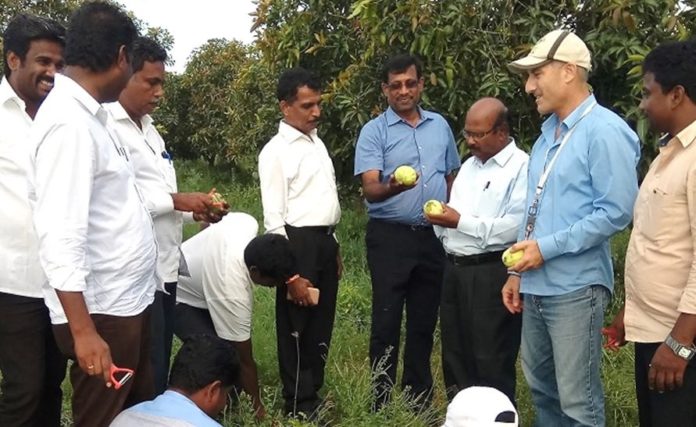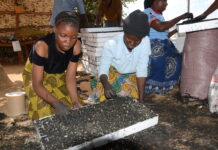Dr. Nimrod Israely – Founder and CEO – Dream Valley
A week ago, at a conference focused on Technology in agriculture, I talked with Indian agro-experts.
Every year there are hundreds of conferences like this one, where you can find the words Agriculture and Technology in their titles and content.
The organizers of these conferences, like most people, associate and sometimes couple Technology with farmers’ business success and prosperity.
This approach claims that No Technology results in Poor Farmers, while More of Advanced Technology results in Thriving/Successful Farmers.
Is it really so?
Israeli farmers are considered successful and highly advanced technologically.
Can their story help us clear the part that Technology plays in reaching success and prosperity?
I opened my presentation with simple Yes/No questions:
Are you satisfied with the state of agriculture in India today?
Are you happy with the income of the farmers in India?
Do you think that Technology is the key to improving farmers’ livelihood?
Do you think that lack of Technology keeps India’s agro sector lagging?
Not so surprising, the Indian experts looked like they all believed Technology is the key to successful and prosperous agriculture.
Then I shared my family’s story, which represents that of many Israeli farmers.
ISRAELI FARMER (SMALLHOLDERS)
Do you think that Israeli farmers began practicing agriculture hundreds of years ago?
Reality is very different. A small part of Israeli farmers began practicing agriculture at the beginning of the 20th Century, e.g., my father’s family emigrated from Poland.
The majority, however, began in the 40s and 50s or 60s of the 20th Century. Many of those new farmers were orphans and holocaust survivors, mostly not skilled farmers, e.g., like my mother.
Following is the short version of how my Kibbutz, an agriculture community, began and developed.
Let’s see if you can put your finger on the moment when Technology became the primary cause of prosperity and economic success.
MY AGRICULTURE COMMUNITY
My mother and her friends were destitute when they climbed in the fall of 1948 on a rocky hill in the Judean Hills.
The starting point seemed impossible to achieve anything meaningful in life other than to survive.
In 1948 they were “less than smallholder.”
But why should I tell you when you can judge for yourself.
Background – 20 years old, orphans, survivors of the Holocaust and Israel’s Independence War.
Land – rocky, little and marginal soil, steep slopes, no trees.
Infrastructure – no electricity, water, roads, or communication.
Housing – tents.
Economic strength – escaping the Nazis, they arrived in Israel with nothing other than the clothes they wore.
Experience – not much other than early training in another Kibbutz.
Could there be a worse starting point?
This small group of people (like hundreds of others around Israel) established and lived the life of a cooperative community, entirely relying on agriculture to support them.
They began by; planting fruit trees and field crops and growing some chickens and cows.
They would sell the products to a food cooperative, i.e., Tnuva, or private traders. From an economic point of view, they didn’t do well at all at the start.
To do better, my mother went to another community to learn more about agriculture from The Expert.
She got more than she hoped for when they fell in love, and after a while, he (Ilan, The Expert) joined her in her Kibbutz/community and became my Father.
As a result, my father began managing the orchards, turning them into more productive, better quality, and far more profitable.
To keep their marriage and work separated, my mother quit the orchards and switched to taking care of cows (for milk).
Fast forward… Ten years later (ONLY 10 years later!), in the 60s, the community agriculture was advanced, and the Kibbutz was prosperous.
Up to this point, did you hear any of the following words, to which today we attribute agricultural success?
Pesticides, Fertilizers, Machinery, Tractors, Sprayers, Automation, Drones, Irrigation, Drip Irrigation, E-trade, Computers, AI (Artificial Intelligence), Deep Tech, Big Data, Smartphone, Technology …
You are welcome to add your list of “technological keywords.”
Those words are not mentioned because none of those existed, BUT because my parents, myself, and other Israeli farmers never viewed those as the key to our success.
This begins to be interesting. If not Technology, what made the BIG difference and made Israel an agriculture global leader?
Hold that thought; soon, you will get the answer.
THE QUESTIONS I ASKED MYSELF
I was born in 1965 into a reality of prosperity. As little as 17 years after the “Impossible Beginning,” we experienced prosperity.
As a child, a teenager, and even a young adult, it all seemed so natural to me that I couldn’t imagine how it could be otherwise.
However, as I traveled the world, I understood that my family, community, and country, Israel, are the exception to the role.
I asked myself, “WHY?”
Before answering – tell me, would you like the agro sector in your country to go through such a transformative process in less than 17 years? If your answer is YES, the following is for you.
First, I gave the same answer as everybody else automatically does – TECHNOLOGY.
But then, as I got to know better farmers in non-developed economies, facts and data didn’t add up.
Unhappy with the answers I received or gave myself, I asked more complex questions.
How is it possible that poor Israeli farmers will become part of the middle class in less than twenty years?
Are the farmers in Israel superman or unusual in another way?
Was the Technology in Israel of the 40s, 50s, 60s, 70s the 20th Century more advanced than today?
Are the soil or climate in Israel unique?
Are the species, varieties, or agricultural produce exceptional?
Etc.
The answers I gave myself were No, No, No…NO!!
Then what was it?
THE HIDDEN DIFFERENCE
I faced two questions;
- If the Israeli Wonder is not Technology, then what is it, and
- Why do people mention Technology as the reason for the Israeli agro sector’s success?
The short answers to the questions are:
The Israeli Wonder results from a dedicated advanced ecosystem and business models established and put in place in the early 20 century. C’est tout.
Hey, once again, Technology is not mentioned as the critical changing element or power.
If so, why do we present Technology as the critical factor?
There are several answers to this; here are a few:
* You can’t share if you don’t know.
You have to know the Israeli agro sector exceptionally well and its history to understand when, how, and why things turned so successfully. Marketing people don’t always carry that knowledge.
* Short, simple message.
To explain and deliver a strong message, it is easy to focus on one topic, and more so, one you can see, touch, and easily perceive – Technology.
* Companies wish to glorify themselves.
They want to sell more and always would say, “Success is thanks to (our) technology.”
* Farmers – People.
They have attributed their professional/business success to their activity. Funny, all Israeli farmers/smallholders are successful because of what they do, and farmers/smallholders elsewhere in the world are poor because of the same reason. Does it make sense?
Nobody is talking about “Ecosystem” and “Business models” as the reason for the Israeli Agro Sector Miracle, partially because no one has practical incentives.
Israeli farmers are born into this Ecosystem, which serves as our Operation System, to which we owe our success.
“Ecosystem” is a big blurred word. To better understand, let’s look at some of the cornerstones in the Israeli Ecosystem, as practiced in Israel for most of its existence.
Marketing – well organized. All farmers have easy and well-established access to premium markets in Israel and abroad. There are dedicated national-scale companies and known organizations for this task, e.g., Tnuva and Agrexco). Remember; Go global or die local.
Field support/extension services – Remember my Father, The Expert. An Israeli farmer can always consult with a colleague or an extension service expert (i.e., SHAHAM) who, if necessary, will visit his field.
Farmers’ Organizations – farmers, have national professional organizations that represent them.
R&D – Israeli Agriculture Research Centers work closely with farmers and provide answers to current and future challenges, e.g., Volcani Center.
Financial – with strict limitations, farmers have access to long-term loans.
Technology – for the most part, Technology is basic, broadly and globally available, and not unique. Even when unique, it is available and accessible on International markets. Hence, no competitive advantage is thanks to Technology.
You can’t touch or see the Ecosystem. It has no address or price tag, but you feel and experience its impact every day of the week when you have a good one.
Technology is part of the Ecosystem and is the one element that is the most material, easy to touch, see, hear, explain, and be impressed by. And its benefits are equal to all.
Tell me, what is easier to “sell” to a visitor/expert/Minister/investor; (A) a complex system and organization structure with officials, researchers, marketers, etc., that will take years to adapt to his country and establish before results are observed. Or (B) a tangible physical item with a tag price and visible performance technological product?
Now I stopped and asked the experts again, “Are you still convinced that Technology is what will save the Indian farmer and the agro sector?
CONNECTING ENDS
Israel is a start-up and innovation nation. But innovation is not limited to Technology. Concepts, ideas, methods, and culture, can be as innovative and impactful on our economy and survival.
The technological edge never made Israel what it is. This, although Technology was and is an integral part of the Israeli Ecosystem and operational scheme.
I learned this from my parents and my own experience.
If you think to advance your agro sector by pushing more “technology” to emulate the Israeli model, you are taking the wrong path, my friend.
Israel’s agro sector success was born long before the Tech Age. It happened thanks to proper design and build of the Ecosystem elements (including business models) and a deep understanding of what poor smallholders need from field to market to convert themselves from poverty to prosperity.
In Israel’s history, there were times when things didn’t work well.
In the 19 century, Israeli farmers received donations and subsidies from European philanthropists. Those donations kept those farmers alive but poor. Sounds familiar?
Farmers need technology and can benefit from it when they are ready and operating within a proper Ecosystem backed up and supported by suitable business models.
Governments and organizations are trying to shortcut by skipping the Ecosystem and focusing on one element – Technology.
And what is the result?
Go back to the questions I addressed to you at the beginning of this column. What are your answers now?
Do you still think that more advanced technology is the salvation?
Is Technology a tool or a goal?
And from a different angle, ask yourself, can we build a skyscraper without deep solid foundations? If not, then what are the foundations?
Do you see why without a supportive, dedicated ecosystem and business models, we cannot have advanced farming?!
This column may not provide you with the “magical” answer to improving the agro sector as some would like.
But, it hands you a clear path to what you should do if you ever want to have an advanced agro sector and a prosperous economy. The alternative is more of the same. It is your choice.
Every day is a good day to start a new and better chapter. Consider making this day “The day of Change” for you, your farmers, and your country.
The immense challenge 175 non-developed countries face sets incredible business opportunities for investors, entrepreneurs, business people, and others.
Just as early investors in China earned $ millions and even $ billions, so too is expected in the context of the agro sector in Africa and other underdeveloped economies.
This is the time to invest, with vision and passion, in the agro sectors of non-developed economies and see those develop and grow and, with it, your profits and ROI.
Do not wait, and do not say I had not told you so.
Investing smartly with a vision is a long-term wise business decision and a landmark for you to be remembered and leave your mark on the betterment of farming, the environment, and the national/international economy.
START A CHANGE
Now that you understand the proper place of Technology in creating progress in the agro sector of your country, it is time to be practical about the following steps to bring about a better future.
The first step is to get real and stop throwing money on things that would never get you to your destination.
I refer to $ billions invested in Technology (e.g., AGRA) but brought no change. Don’t expect things to be different tomorrow only because you want them to.
Stop the bleeding. Change the direction. As it is in any business, when something contributes less than you thought, you decrease your investments in it and redirect those to more productive channels.
The second step is to do what others consider “impossible.” Start by building an advanced ecosystem and dedicated business models.
Participate in the IBMA conference, and you can learn much more about dedicated business models for smallholders.
The International Conference on Business Models in Agriculture (IBMA) will be held in March 2023 in Kigali, Rwanda.
The third step is to move things, boots on the ground style. This you do through the Dream Valley National Export Model (Program, trading Platform, and Business Models).
The Dream Valley Package includes technologies and services, e.g., the Freedome and FFCTZ technology and protocol for fruit fly management. Dream Valley will provide tailor-made solutions per target crop/s, region, state, or country.
TAKEAWAYS
» THE SECRET OF THE “Israeli agricultural miracle” is in a tailor-made Ecosystem with dedicated business models.
» COPY PASTE is not an option! Tailor-made of a dedicated ecosystem and business models based on the Israeli model and proven field results is advised.
Please look at the video series, “The Agricultural Gap.” With short videos, mostly 2 to 4 minutes long, I explain the historical roots of the agricultural gap between Africa and Western countries.








